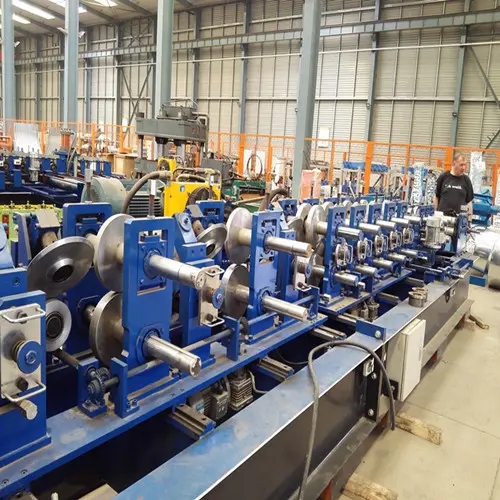
The Advantages of Downpipe Roll Forming Machines
In the ever-evolving landscape of manufacturing, efficiency and precision play crucial roles in producing high-quality products. Among the various technologies available, downpipe roll forming machines have emerged as a game-changer for producing downpipes with exceptional accuracy and speed. This article explores the significance of downpipe roll forming machines and the advantages they bring to the manufacturing process.
A downpipe roll forming machine is specifically designed to create downpipes used in drainage systems, particularly in residential and commercial buildings. These machines use a continuous roll forming process, which involves feeding a flat metal sheet through a series of rollers that gradually shape it into the desired profile. This method allows for high production rates while maintaining consistency and quality, making it a preferred choice for manufacturers.
One of the primary advantages of downpipe roll forming machines is their ability to produce custom profiles tailored to specific project requirements. Unlike traditional manufacturing methods, which may involve cutting and welding, roll forming offers greater flexibility in design. Manufacturers can easily adjust the machine settings to create various shapes and sizes, accommodating the diverse needs of their clients.

Moreover, the roll forming process is highly efficient. Once the settings are configured, the machine can operate continuously, producing long lengths of downpipes with minimal labor intervention. This efficiency not only reduces production times but also lowers labor costs, allowing manufacturers to allocate resources more effectively.
Durability is another key benefit of using downpipe roll forming machines. The process typically employs high-quality materials, which are formed into robust profiles. The resulting downpipes exhibit excellent longevity, withstanding harsh weather conditions and minimizing the need for frequent replacements. This attribute is particularly important in regions with extreme climates, where durability is vital for the longevity of building materials.
Additionally, roll forming contributes to sustainability in manufacturing. The process generates minimal waste compared to traditional methods, as it utilizes the material more effectively. Manufacturers can recycle leftover materials, further reducing their environmental footprint and promoting green practices within the industry.
In conclusion, downpipe roll forming machines represent a significant advancement in manufacturing technologies. With their ability to produce customized, durable, and efficient products while minimizing waste, they offer a competitive advantage for manufacturers. As the construction industry continues to grow, the demand for innovative solutions like downpipe roll forming machines will likely increase, paving the way for a more efficient and sustainable future.